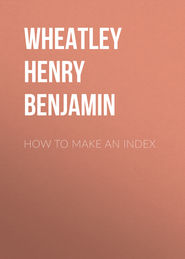По всем вопросам обращайтесь на: info@litportal.ru
(©) 2003-2024.
✖
How to Form a Library, 2nd ed
Автор
Год написания книги
2018
Настройки чтения
Размер шрифта
Высота строк
Поля
Charles Burney, the Greek scholar, is said to have expended nearly £25,000 on his library, which consisted of more than 13,000 printed volumes and a fine collection of MSS. The library was purchased for the British Museum for the sum of £13,500.
Charles Burney probably inherited his love of collecting from his father, for Dr. Burney possessed some twenty thousand volumes. These were rather an incumbrance to the Doctor, and when he moved to Chelsea Hospital, he was in some difficulty respecting them. Mrs. Chapone, when she heard of these troubles, proved herself no bibliophile, for she exclaimed, "Twenty thousand volumes! bless me! why, how can he so encumber himself? Why does he not burn half? for how much must be to spare that never can be worth his looking at from such a store! and can he want to keep them all?"
The love of books will often form a tie of connection between very divergent characters, and in dealing with men who have formed libraries we can bring together the names of those who had but little sympathy with each other during life.
George III. was a true book collector, and the magnificent library now preserved in the British Museum owes its origin to his own judgment and enthusiastic love for the pursuit. Louis XVI. cared but little for books until his troubles came thick upon him, and then he sought solace from their pages. During that life in the Temple we all know so well from the sad reading of its incidents, books were not denied to the persecuted royal family. There was a small library in the "little tower," and the king drew up a list of books to be supplied to him from the library at the Tuileries. The list included the works of Virgil, Horace, Ovid, and Terence; of Tacitus, Livy, Cæsar, Marcus Aurelius, Eutropius, Cornelius Nepos, Florus, Justin, Quintus Curtius, Sallust, Suetonius and Velleius Paterculus; the Vies des Saints, the Fables de la Fontaine, Télèmaque, and Rollin's Traité des Etudes.[6 - Edwards, Libraries and Founders of Libraries, p. 115.]
The more we know of Napoleon, and anecdotes of him are continually being published in the ever-lengthening series of French memoirs, the less heroic appears his figure, but he could not have been entirely bad, for he truly loved books. He began life as an author, and would always have books about him. He complained if the printing was bad or the binding poor, and said, "I will have fine editions and handsome binding. I am rich enough for that."[7 - Edwards, Libraries and Founders, p. 136.] Thus spoke the true bibliophile. Mr. Edwards has collected much interesting information respecting Napoleon and his libraries, and of his labours I here freely avail myself. Bourrienne affirms that the authors who chiefly attracted Napoleon in his school days were Polybius, Plutarch, and Arrian. "Shortly before he left France for Egypt, Napoleon drew up, with his own hand, the scheme of a travelling library, the charge of collecting which was given to John Baptist Say, the Economist. It comprised about three hundred and twenty volumes, more than half of which are historical, and nearly all, as it seems, in French. The ancient historians comprised in the list are Thucydides, Plutarch, Polybius, Arrian, Tacitus, Livy, and Justin. The poets are Homer, Virgil, Tasso, Ariosto, the Télèmaque of Fénélon, the Henriade of Voltaire, with Ossian and La Fontaine. Among the works of prose fiction are the English novelists in forty volumes, of course in translations, and the indispensable Sorrows of Werter, which, as he himself told Goethe, Napoleon had read through seven times prior to October, 1808. In this list the Bible, together with the Koran and the Vedas, are whimsically, but significantly, entered under the heading Politics and Ethics (Politique et Morale).[8 - Correspondance de Napoleon I
, IV. pp. 37, 38, quoted by Edwards, Libraries and Founders, p. 130.]
Napoleon was not, however, satisfied with the camp libraries which were provided for him; the good editions were too bulky and the small editions too mean: so he arranged the plan of a library to be expressly printed for him in a thousand duodecimo volumes without margins, bound in thin covers and with loose backs. "In this new plan 'Religion' took its place as the first class. The Bible was to be there in its best translation, with a selection of the most important works of the Fathers of the Church, and a series of the best dissertations on those leading religious sects—their doctrines and their history—which have powerfully influenced the world. This section was limited to forty volumes. The Koran was to be included, together with a good book or two on mythology. One hundred and forty volumes were allotted to poetry. The epics were to embrace Homer, Lucan, Tasso, Telemachus, and the Henriade. In the dramatic portion Corneille and Racine were of course to be included, but of Corneille, said Napoleon, you shall print for me 'only what is vital' (ce qui est resté), and from Racine you shall omit 'Les Frères ennemis, the Alexandre, and Les Plaideurs. Of Crébillon, he would have only Rhadamiste and Atrée et Thyeste. Voltaire was to be subject to the same limitation as Corneille.'"[9 - Edwards, Libraries and Founders, p. 133.] In prose fiction Napoleon specifies the Nouvelle Héloise and Rousseau's Confessions, the masterpieces of Fielding, Richardson and Le Sage, and Voltaire's tales. Soon after this Napoleon proposed a much larger scheme for a camp library, in which history alone would occupy three thousand volumes. History was to be divided into these sections—I. Chronology and Universal History. II. Ancient History (a. by ancient writers, b. by modern writers). III. History of the Lower Empire (in like subdivisions). IV. History, both general and particular. V. The Modern History of the different States of Europe. The celebrated bibliographer Barbier drew up, according to the Emperor's orders, a detailed catalogue of the works which should form such a library. "He calculated that by employing a hundred and twenty compositors and twenty-five editors, the three thousand volumes could be produced, in satisfactory shape, and within six years, at a total cost of £163,200, supposing fifty copies of each book to be printed."[10 - Edwards, Libraries and Founders, p. 135.] The printing was begun, but little was actually done, and in six years Napoleon was in St. Helena.
In his last island home Napoleon had a library, and he read largely, often aloud, with good effect. It is an interesting fact that among Napoleon's papers were found some notes on Geography written when a boy, and these close with the words—"Sainte-Hélène—petite ile."[11 - Edwards, Libraries and Founders, p. 142.]
In recapitulating here the names of a few of the famous men who have formed libraries it will be necessary to divide them into two classes, 1, those whose fame arises from their habit of collecting, and 2, those authors in whose lives we are so much interested that the names of the books they possessed are welcomed by us as indications of their characters. What can be said of the libraries of the Duke of Roxburghe, Earl Spencer, Thomas Grenville, and Richard Heber that has not been said often before? Two of these have been dispersed over the world, and two remain, one the glory of a noble family, and the other of the nation, or perhaps it would be more proper to say both are the glory of the nation, for every Englishman must be proud that the Spencer Library still remains intact.
Heber left behind him over 100,000 volumes, in eight houses, four in England and four on the Continent, and no record remains of this immense library but the volumes of the sale catalogues. Such wholesale collection appears to be allied to madness, but Heber was no selfish collector, and his practice was as liberal as Grolier's motto. His name is enshrined in lasting verse by Scott:—
"Thy volumes, open as thy heart,
Delight, amusement, science, art,
To every ear and eye impart;
Yet who of all that thus employ them,
Can like the owner's self enjoy them?—
But hark! I hear the distant drum:
The day of Flodden Field is come—
Adieu, dear Heber! life and health,
And store of literary wealth."
—MARMION, Introduction to the Sixth Canto.
The Duke of Sussex was a worthy successor of his father, George III., in the ranks of book-collectors, and his library is kept in memory by Pettigrew's fine catalogue.
Douce and Malone the critics, and Gough the antiquary, left their libraries to the Bodleian, and thus many valuable books are available to students in that much-loved resort of his at Oxford. Anthony Morris Storer, who is said to have excelled in everything he set his heart on and hand to, collected a beautiful library, which he bequeathed to Eton College, where it still remains, a joy to look at from the elegance of the bindings. His friend Lord Carlisle wrote of him—
"Whether I Storer sing in hours of joy,
When every look bespeaks the inward boy;
Or when no more mirth wantons in his breast,
And all the man in him appears confest;
In mirth, in sadness, sing him how I will,
Sense and good nature must attend him still."
Jacob Bryant the antiquary left his library to King's College, Cambridge. At one time he intended to have followed Storer's example, and have left it to Eton College, but the Provost offended him, and he changed the object of his bequest. It is said that when he was discussing the matter, the Provost asked whether he would not arrange for the payment of the carriage of the books from his house to Eton. He thought this grasping, and King's gained the benefit of his change of mind.
Among great authors two of the chief collectors were Scott and Southey. Scott's library still remains at Abbotsford, and no one who has ever entered that embodiment of the great man's soul can ever forget it. The library, with the entire contents of the house, were restored to Scott in 1830 by his trustees and creditors, "As the best means the creditors have of expressing their very high sense of his most honourable conduct, and in grateful acknowledgment of the unparalleled and most successful exertions he has made, and continues to make for them." The library is rich in the subjects which the great author loved, such as Demonology and Witchcraft. In a volume of a collection of Ballads and Chapbooks is this note written by Scott in 1810: "This little collection of stall tracts and ballads was formed by me, when a boy, from the baskets of the travelling pedlars. Until put into its present decent binding, it had such charms for the servants, that it was repeatedly, and with difficulty, recovered from their clutches. It contains most of the pieces that were popular about thirty years since, and I dare say many that could not now be procured for any price."
It is odd to contrast the book-loving tastes of celebrated authors. Southey cared for his books, but Coleridge would cut the leaves of a book with a butter knife, and De Quincey's extraordinary treatment of books is well described by Mr. Burton in the Book Hunter. Charles Lamb's loving appreciation of his books is known to all readers of the delightful Elia.
Southey collected more than 14,000 volumes, which sold in 1844 for nearly £3000. He began collecting as a boy, for his father had but few books. Mr. Edwards enumerates these as follows: The Spectator, three or four volumes of the Oxford Magazine, one volume of the Freeholder's Magazine, and one of the Town and Country Magazine, Pomfret's Poems, the Death of Abel, nine plays (including Julius Cæsar, The Indian Queen, and a translation of Merope), and a pamphlet.[12 - Libraries and Founders of Libraries, p. 95.]
Southey was probably one of the most representative of literary men. His feelings in his library are those of all book-lovers, although he could express these feelings in language which few of them have at command:—
My days among the dead are passed;
Around me I behold,
Where'er these casual eyes are cast,
The mighty minds of old:
My never-failing friends are they,
With whom I converse day by day.
With them I take delight in weal,
And seek relief in woe;
And while I understand and feel
How much to them I owe,
My cheeks have often been bedewed
With tears of thoughtful gratitude.
My thoughts are with the dead; with them
I live in long-past years;
Their virtues love, their faults condemn,
Partake their hopes and fears,
And from their lessons seek and find
Instruction with a humble mind.
My hopes are with the dead; anon
My place with them will be
And I with them shall travel on
Through all futurity;
Yet leaving here a name, I trust,
That will not perish in the dust.
Mr. Henry Stevens read a paper or rather delivered an address at the meeting of the Library Association held at Liverpool in 1883, containing his recollections of Mr. James Lenox, the great American book collector. I had the pleasure of listening to that address, but I have read it in its finished form with even greater delight. It is not often that he who pleases you as a speaker also pleases you as writer, but Mr. Stevens succeeds in both. If more bibliographers could write their reminiscences with the same spirit that he does, we should hear less of the dullness of bibliography. I strongly recommend my readers to take an early opportunity of perusing this paper in the Liverpool volume of the Transactions of the Library Association.
Mr. Stevens, among his anecdotes of Mr. Lenox, records that he "often bought duplicates for immediate use, or to lend, rather than grope for the copies he knew to be in the stocks in some of his store rooms or chambers, notably Stirling's Artists of Spain, a high-priced book."
This is a common trouble to large book collectors, who cannot find the books they know they possess. The late Mr. Crossley had his books stacked away in heaps, and he was often unable to lay his hands upon books of which he had several copies.
CHAPTER II.
How to Buy
A discussion has arisen lately in bibliographical journals as to how best to supply libraries with their books, the main principle agreed upon being that it is the duty of the librarian to buy his books as cheaply as possible. Some of these views are stated by Mr. H.R. Tedder in a letter printed in the Library Chronicle for July, 1884 (vol. i. p. 120). It appears that Professor Dziatzko contends that the books should always be bought as cheaply as possible, but that Dr. Julius Petzholdt holds the opinion that the chief object of the librarian should be to get his books as early as possible and not to wait until they can be had at second-hand. Mr. Tedder thinks that the two plans of rapidity of supply and cheapness of cost can in some respect be united. Of course there can be no difference of opinion in respect to the duty of the librarian to get as much for his money as he can, but there are other points which require to be considered besides those brought forward before a satisfactory answer to the question—How to Buy? can be obtained. There are three points which seem to have been very much overlooked in the discussion, which may be stated here. 1. Is the librarian's valuable time well occupied by looking after cheap copies of books? 2. Will not the proposed action on the part of librarians go far to abolish the intelligent second-hand bookseller in the same way as the new bookseller has been well-nigh abolished in consequence of large discounts? 3. Will not such action prevent the publication of excellent books on subjects little likely to be popular?
1. Most librarians find their time pretty well occupied by the ordinary duties of buying, arranging, cataloguing, and finding the books under their charge, and it will be generally allowed that the librarian's first duty is to be in his library, ready to attend to those who wish to consult him. Now the value of his time can be roughly estimated for this purpose in money, and the value of the time spent in doing work which could be as well or better done by a bookseller should fairly be added to the cost of the books.
2. It has hitherto been thought advisable to have one or more second-hand booksellers attached to an important library, from whom the librarian may naturally expect to obtain such books as he requires. Of course a man of knowledge and experience must be paid for the exercise of these qualities, but the price of books is so variable that it is quite possible that the bookseller, from his knowledge, may buy the required books cheaper than the librarian himself would pay for them. As far as it is possible to judge from the information given us respecting the collection of libraries, bookbuyers have little to complain of as to the price paid by them to such respectable booksellers as have acted as their agents. Perhaps too little stress has been laid upon that characteristic which is happily so common among honest men, viz. that the agent is as pleased to get wares cheap for a good customer as for himself. Mr. Tedder says in his letter, "For rarer books I still consider it safer and cheaper in the long run to cultivate business relations with one or more second-hand booksellers, and pay them for their knowledge and experience." But is this quite fair, and is it not likely that the rarer books will be supplied cheaper if the bookseller is allowed to pay himself partly out of the sale of the commoner books, which it is now proposed the librarian shall buy himself? My contention is that it is for the advantage of libraries that intelligent booksellers, ready to place their knowledge at the service of the librarians, should exist, and it is unwise and uneconomic to do that which may cause this class to cease to exist. Sellers of books must always exist, but it is possible to drive out of the trade those who do it the most honour. We see what has occurred in the new book trade, and there can be little doubt that the book-buyer loses much more than he gains by the present system of discount. When the bookseller could obtain sufficient profit by the sale of new books to keep his shop open, it was worth his while to take some trouble in finding the book required; but now that the customer expects to buy a book at trade price, he cannot be surprised if he does not give full particulars as to the publisher of the book he requires if it is reported to him as "not known." Those only who, by taking a large quantity of copies, obtain an extra discount, can make new bookselling pay.
3. There are a large number of books which, although real additions to literature, can only be expected to obtain a small number of readers and buyers. Some of these are not taken by the circulating libraries, and publishers, in making their calculations, naturally count upon supplying some of the chief libraries of the country. If these libraries wait till the book is second-hand, the number of sales is likely to be so much reduced that it is not worth while to publish the book at all, to the evident damage of the cause of learning.
It has been often suggested that an arrangement should be made by libraries in close proximity, so that the same expensive book should not be bought by more than one of the libraries. No doubt this is advantageous in certain circumstances, but in the case of books with a limited sale it would have the same consequence as stated above, and the book would not be published at all, or be published at a loss.









